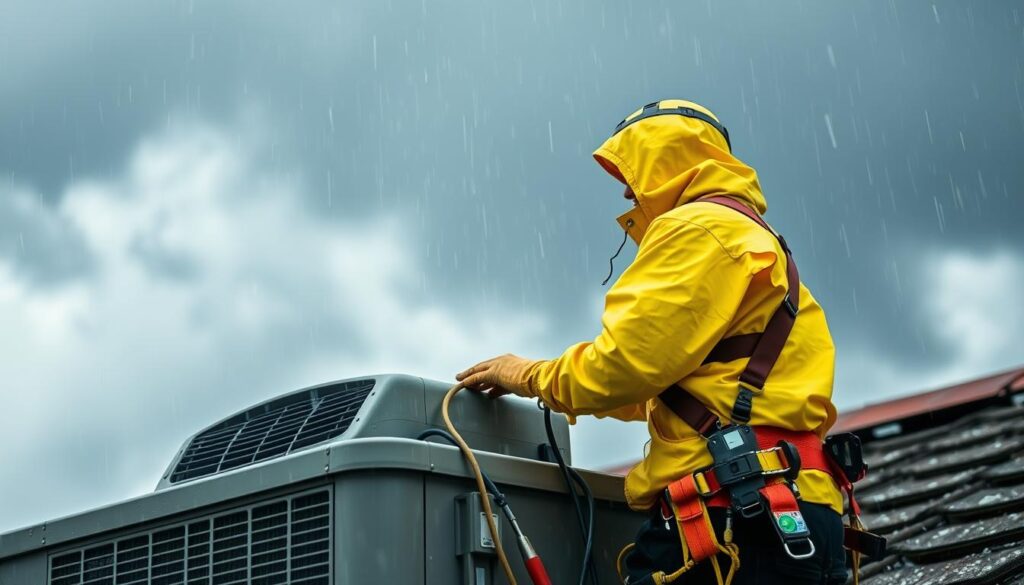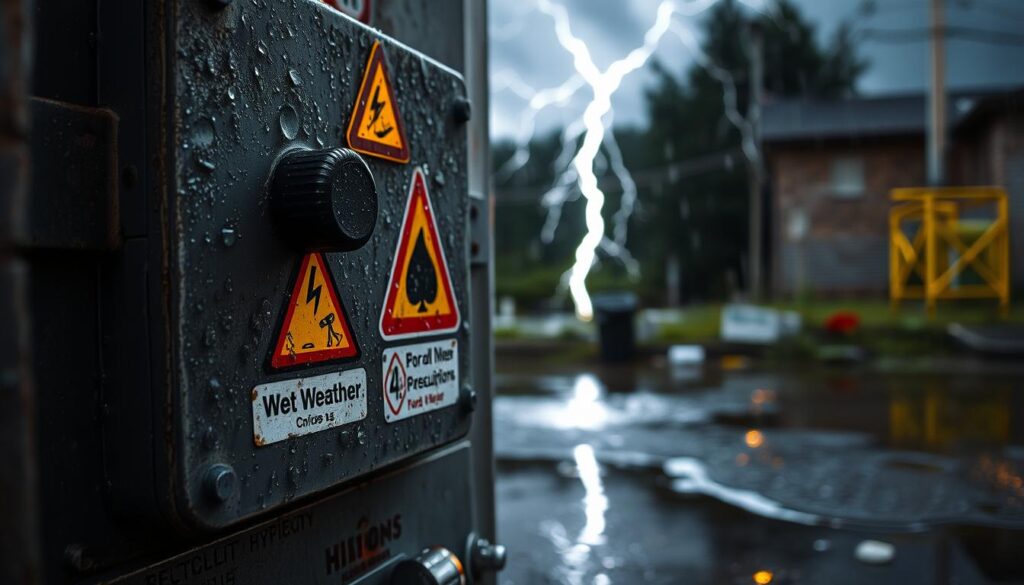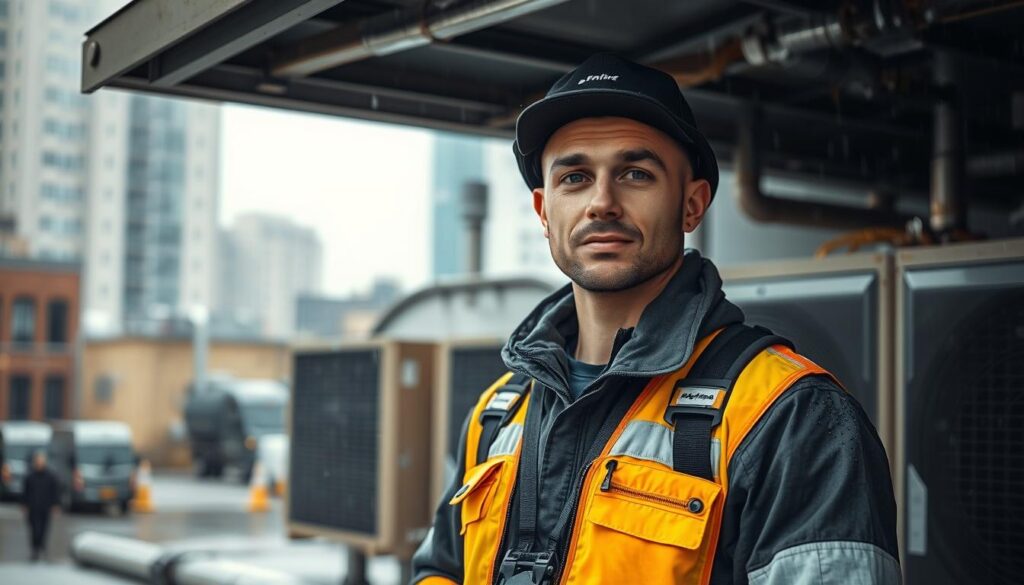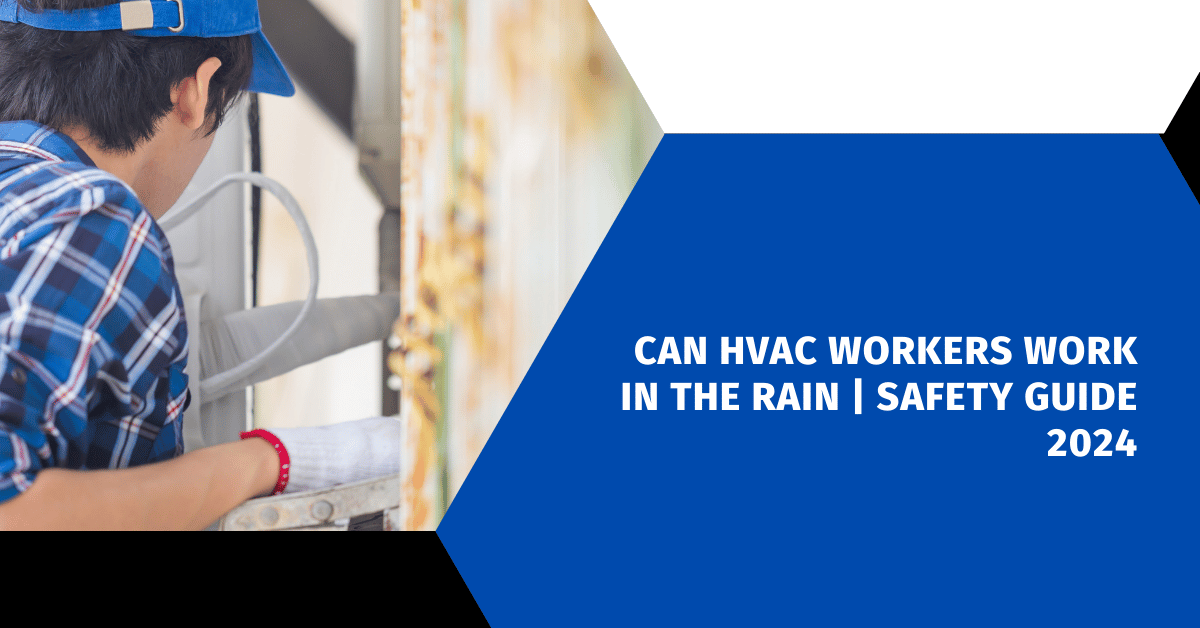Affiliate Disclosure
HVAC Guide Guys is a participant in the Amazon Services LLC Associates Program, an affiliate advertising program designed to provide a means for sites to earn advertising fees by advertising and linking to Amazon.
Can HVAC Workers Work in the Rain? As an HVAC technician, have you ever wondered if it’s safe to work on your client’s system during a rainstorm? Weather can be unpredictable, and HVAC systems need to work all year. Working in the rain can be tough, but how do you stay safe and keep the equipment working right? This guide will cover the key safety tips for HVAC workers in rainy conditions.

Key Takeaways
- HVAC technicians face unique safety risks when working in wet weather conditions, including electrical hazards, slips and falls, and exposure to hazardous materials.
- Proper safety equipment and training are essential for HVAC workers to mitigate these risks and ensure their wellbeing on the job.
- Understanding OSHA guidelines and industry best practices can help HVAC companies develop effective protocols for protecting their employees during rainy weather.
- Careful assessment of weather conditions and a thorough understanding of electrical safety measures are crucial for HVAC technicians working in the rain.
- Maintaining weather-resistant tools and equipment is vital for HVAC workers to perform their duties safely and effectively in wet environments.
Table of Contents
Understanding HVAC Work Safety Fundamentals
Working in the HVAC (Heating, Ventilation, and Air Conditioning) industry has its own safety risks. HVAC technicians must stay alert and follow safety rules to keep themselves and others safe. Let’s look at the main safety points in this field.
Key Safety Statistics in HVAC Industry
In 2020, the US Bureau of Labor Statistics reported 7,900 cases of workplace illnesses and injuries in HVAC. The most common accidents were sprains, strains, and tears, with 2,420 cases. Other top accidents included cuts, fractures, bruises, and chemical burns.
Common Weather-Related Hazards
HVAC technicians often work in different weather, facing many dangers. They can get shocked by electricity, hurt by chemicals, or injured by falls. Weather like heat or cold can also be a risk.
OSHA Guidelines for Outdoor Work
The Occupational Safety and Health Administration (OSHA) has rules to keep HVAC workers safe, especially outdoors. These rules cover things like dangerous materials, electrical safety, and breathing protection. Following these rules is key to a safe work place and avoiding weather-related dangers.
“HVAC technicians must exhibit professionalism by being punctual, well-groomed, and respectful towards customers, presenting a positive image of themselves and their company.”
Explore Our HVAC Shop
Looking for top-rated HVAC tools, parts, and accessories? Visit our shop and find the perfect solution for your needs.
Visit the ShopEssential Safety Equipment for Wet Conditions
When HVAC technicians work in wet weather, they must prioritize their safety with the right safety equipment. Investing in waterproof gear and slip-resistant safety equipment is crucial to prevent accidents and ensure productivity on the job site.
A high-visibility rain jacket or poncho is a must-have for wet conditions. These garments have reflective strips and bright colors. They make workers more visible to heavy machinery and passing vehicles, reducing the risk of collisions. Waterproof and breathable fabrics like Gore-Tex or PVC-coated polyester keep the wearer dry and comfortable even in heavy downpours.
HVAC technicians should also wear waterproof gloves to maintain a secure grip on tools and equipment. Leather or synthetic gloves with textured palms and fingers provide excellent dexterity and protection against cuts and abrasions. Slip-resistant, steel-toed work boots with good traction are another essential piece of safety gear for wet conditions. They prevent slips, trips, and falls on slippery surfaces.
| Safety Equipment | Key Features | Purpose |
|---|---|---|
| High-visibility rain jacket or poncho | Reflective strips, bright colors | Improve visibility and reduce collision risk |
| Waterproof gloves | Textured palms and fingers, durable materials | Maintain secure grip on tools and equipment |
| Slip-resistant, steel-toed work boots | Rugged soles, protective toe caps | Prevent slips, trips, and falls on wet surfaces |
By investing in the right safety equipment, HVAC technicians can stay dry, visible, and secure while working in wet weather conditions. This minimizes the risk of accidents and enhances their overall productivity on the job.
Can HVAC Workers Work in the Rain?
As an HVAC technician, you often work outside, facing rain. Light rain is okay, but heavy rain is risky. You need to be careful and follow safety rules.
Light Rain vs. Heavy Rain Conditions
HVAC workers can work in light rain if they’re careful. They should wear rain safety gear and protect electrical stuff. But, heavy rain is dangerous, with risks like electrical shocks and slippery floors.
Emergency Response Protocols
It’s key to have emergency response protocols for rain. You need clear communication and safe places to go. Training helps workers react fast to bad weather.
Risk Assessment Guidelines
Before starting work in the rain, HVAC techs must do a risk assessment. They should think about the job, how bad the rain is, and if there’s lightning. This helps decide if it’s safe to work or wait for better weather.
Explore Our HVAC Shop
Looking for top-rated HVAC tools, parts, and accessories? Visit our shop and find the perfect solution for your needs.
Visit the ShopElectrical Safety Measures During Wet Weather
Working on HVAC systems in wet weather is risky. As an HVAC technician, keeping electrical safety top of mind is key. Always make sure the electrical equipment is turned off before starting work. This step helps avoid dangerous accidents.
When it rains or there’s standing water, turn off the main circuit breaker to the HVAC system. This simple action can prevent equipment failure and lower the risk of electrocution. Wearing the right personal protective equipment (PPE), like rubber gloves and boots, also helps protect you from electrical dangers.
- Verify that all electrical equipment is de-energized before starting work.
- Turn off the main circuit breaker to the HVAC system when working in wet conditions.
- Wear rubber gloves and boots as part of your PPE to insulate against electrical shocks.
- Inspect all tools and equipment to ensure they are in good working condition and rated for outdoor use.
- Maintain a safe distance from any exposed electrical components or live wires.
By taking these important electrical safety steps, you can greatly lower the risks of working on HVAC systems in wet weather. Keeping safety first not only protects you and your team but also ensures your HVAC electrical work is done right, even in tough weather.

| Electrical Safety Measure | Purpose |
|---|---|
| De-energize electrical equipment | Eliminate the risk of electric shock |
| Turn off main circuit breaker | Prevent equipment failure and electrocution |
| Wear rubber PPE | Insulate against electrical hazards |
| Inspect tools and equipment | Ensure they are in good working condition and rated for outdoor use |
| Maintain safe distance from live components | Avoid direct contact with electrical hazards |
By focusing on these electrical safety steps, HVAC technicians can work safely in wet conditions. This protects themselves and their teams from the dangers of working on energized systems in bad weather.
Explore Our HVAC Shop
Looking for top-rated HVAC tools, parts, and accessories? Visit our shop and find the perfect solution for your needs.
Visit the ShopProper Tools and Equipment for Rainy Conditions
Working as an HVAC technician in the rain can be tough. But, using the right tools and equipment makes it safer and more efficient. Here’s what you need to keep dry and protected.
Waterproof Tool Requirements
It’s important to use tools that can handle rain. Look for tools with features like:
- Waterproof or water-resistant casings
- Nonslip grips to prevent slippage in wet conditions
- Rust-resistant materials like stainless steel or anodized aluminum
Good waterproof tools prevent damage and work well, even in the wet.
Equipment Maintenance in Wet Weather
Keeping your HVAC equipment in good shape is key, especially in the rain. Make sure to:
- Thoroughly clean and dry all tools and equipment after use
- Inspect for any signs of water damage or corrosion
- Apply a protective coating or lubricant to prevent rust and weathering
Regular maintenance keeps your equipment working well, even in wet conditions.
Storage and Transportation Tips
It’s important to protect your tools and equipment when not in use. Here are some tips:
- Use waterproof or water-resistant storage containers and tool bags
- Avoid leaving equipment in the back of an open truck bed during transport
- Store tools and gear in a dry, well-ventilated area when not in use
By following these tips, your tools and equipment will stay in great shape for your next job in the rain.
Having the right tools, maintaining them well, and storing them safely are crucial for HVAC technicians in the rain. By doing these things, you can stay productive, efficient, and safe, even on rainy days.
Personal Protective Equipment for Wet Weather
When working on HVAC in wet weather, the right personal protective equipment (PPE) is key. It keeps technicians safe and healthy. They need special gear to stay dry and secure in rainy or damp places.
Waterproof coveralls or rain suits are a must. They keep clothes and skin dry. Non-slip, water-resistant boots help technicians stay on their feet. This is important because slips and falls are common, causing many injuries.
Water-resistant gloves are also important. They help technicians hold onto tools and equipment. This prevents accidents and lets them work well even when it’s wet. Respiratory protection is needed too to avoid breathing in mold spores or other harmful particles.
The American National Standards Institute (ANSI) and the International Safety Equipment Association (ISEA) set standards for safety gear. The ANSI/ISEA 107-2020 standard ensures HVAC workers are seen in different weather and light conditions.
| PPE Item | Purpose | Recommended Standards |
|---|---|---|
| Waterproof Coveralls | Protect against moisture and water | ANSI/ISEA 107-2020 |
| Non-Slip Boots | Prevent slips and falls on wet surfaces | ANSI/ISEA 121-2018 |
| Water-Resistant Gloves | Maintain grip and dexterity in wet conditions | ANSI/ISEA 105-2016 |
| Respiratory Protection | Prevent inhalation of airborne contaminants | OSHA 1910.134 |
By giving HVAC technicians the right PPE, wet weather gear, and HVAC protective equipment, employers can keep their workers safe. This is true even in tough weather conditions.
Explore Our HVAC Shop
Looking for top-rated HVAC tools, parts, and accessories? Visit our shop and find the perfect solution for your needs.
Visit the ShopWeather-Related Work Protocols and Procedures
As an HVAC pro, dealing with weather challenges is key. Having clear protocols and procedures is vital. They help keep your team safe and projects on track, even when the weather is bad.
Decision-Making Framework
Creating a strong decision-making framework is crucial. It helps decide when to keep working or stop due to bad weather. This framework should look at rain intensity, lightning, wind, and how it affects your site and team.
- Keep an eye on weather forecasts and updates.
- Set clear rain, wind, and weather limits for stopping work.
- Let your team share their weather concerns and ideas.
- Be ready to adjust quickly to weather changes.
Communication Guidelines
Good communication is key to keeping your team informed about weather safety and work changes. Set up clear guidelines for talking about weather-related safety and work plans.
- Have a plan for regular updates, pre-shift talks, and emergency alerts.
- Share the decision-making framework and weather work stop limits clearly.
- Make sure everyone knows their part in handling weather issues.
- Keep clients, project managers, and others updated on weather delays or changes.
| Weather Condition | Recommended Action | Communication Protocols |
|---|---|---|
| Light Rain | Proceed with work, following safety protocols | Inform team of weather conditions and safety measures |
| Heavy Rain | Suspend outdoor work, focus on indoor tasks | Notify team and clients of work plan changes |
| Thunderstorms | Cease all outdoor work, seek shelter immediately | Alert team, contact emergency services if necessary |
By setting up detailed weather work protocols, you ensure your HVAC team’s safety. You also keep communication open and adapt to weather changes well.
Explore Our HVAC Shop
Looking for top-rated HVAC tools, parts, and accessories? Visit our shop and find the perfect solution for your needs.
Visit the ShopLegal Considerations and Worker Rights
As an HVAC technician, knowing your rights is key. This includes the right to say no to unsafe work. Employers must follow OSHA rules and keep the workplace safe, especially in bad weather like heavy rain.
Knowing your legal rights and safety rules helps keep you and your employer safe. It lets you stand up for your health and make smart choices when faced with dangers at work.
- HVAC workers have the right to a safe and healthy workplace, as outlined by the Occupational Safety and Health Act (OSHA).
- Employers must give HVAC technicians the right PPE and safety training, especially in wet conditions.
- Workers can say no to work that’s too risky without getting in trouble from their boss.
- OSHA rules say employers must fix any safety problems in the workplace, including bad weather and wet jobs.
By knowing their rights and safety rules, HVAC technicians can work safely with their bosses, even in tough weather. This knowledge builds a safe work culture and helps workers focus on their health at work.
“The right to a safe and healthy working environment is fundamental to every worker in America. OSHA is committed to ensuring that employers provide their workers with a safe workplace.”

Conclusion
Working in wet conditions is tough for HVAC technicians. But, by following HVAC safety summary rules, using the right gear, and knowing wet weather precautions, you can stay safe. It’s key to keep learning and follow safety best practices to protect yourself and others.
Being ready and taking action is crucial. Get the right tools and wear the right gear. Also, know OSHA rules and have a plan for emergencies. This way, you can work safely in the rain and provide great service to your clients.
Your safety and that of your team should always come first. By focusing on safety and always trying to do better, you can handle the rain with confidence. This will help your HVAC business thrive in the long run.

